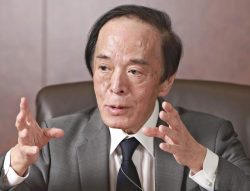12:18 JST, September 20, 2022
The stable supply of food is threatened by the deteriorating global security environment and climate change. The Japanese government must take the situation seriously and rethink its strategy on this issue.
To strengthen food security, Prime Minister Fumio Kishida has instructed relevant ministries and agencies to review the Basic Law on Food, Agriculture and Rural Areas, which was enacted in 1999 and serves as the nation’s basic policy for agricultural policy. It is said that the Agriculture, Forestry and Fisheries Ministry will take the lead in reviewing the law, over a period of about one year.
Economic globalization has progressed with the end of the Cold War. Economic rationality was emphasized in the globalized economy, and food could be secured by cooperating in mass production in regions with high productivity and importing food from such regions.
However, the Ukraine crisis has greatly shaken this premise. Supplies of wheat and other commodities have been disrupted, and prices have soared. Some countries are restricting exports in favor of securing foods for their own consumption. Another concern is that climate change is causing frequent droughts around the world.
It is necessary to reexamine the basic law and accurately reflect changes in the situation in the nation’s agricultural policy.
Japan is highly dependent on food imports, with its calorie-based self-sufficiency rate standing at 38% in fiscal 2021. This is one of the lowest levels among developed countries.
In particular, most of the grains consumed in Japan — such as corn, wheat and soybeans — are imported, except for rice.
The country’s food imports are severely unbalanced, with the four countries of the United States, Australia, Canada and Brazil accounting for more than 70% of Japan’s food imports. All of these countries are friendly to Japan, but once a contingency occurs, marine transport will become difficult and supply could be disrupted.
It is essential to strengthen the domestic production base. The government is providing subsidies to encourage a shift to wheat and soybeans as well as crops to feed livestock, reducing the production of rice as a staple food. Expanding this subsidy program would be a valuable option.
Efforts should also be made to expand grain production using idle farmland.
However, replacing the entire food supply with domestic production would be costly and impractical. It will be important to select crops that will be given priority in domestic production and to provide support measures.
Japan must further strengthen its cooperative relationship with countries that are major sources of imports, and at the same time consider increasing stockpiles of imported grains and other commodities.
Farmers in Japan are aging, and their numbers are decreasing significantly.
To strengthen the domestic production base, it is important to increase farmers’ income and make farming profitable. One effective way to do this is to increase exports of domestically produced agricultural products to overseas markets. Exports are steadily increasing, and the government should provide stronger support for this purpose.
(From The Yomiuri Shimbun, Sept. 20, 2022)
Top Articles in Editorial & Columns
-

Riku-Ryu Pair Wins Gold Medal: Their Strong Bond Leads to Major Comeback Victory
-

Reciprocal Tariffs Ruled Illegal: Judiciary Would Not Tolerate President’s High-Handed Approach
-

China Provoked Takaichi into Risky Move of Dissolving House of Representatives, But It’s a Gamble She Just Might Win
-

Japan’s Plan for Investment in U.S.: Aim for Mutual Development by Ensuring Profitability
-

Flu Cases Surging Again: Infection Can Also Be Prevented by Humidifying Indoor Spaces
JN ACCESS RANKING
-

Producer Behind Pop Group XG Arrested for Cocaine Possession
-

Japan PM Takaichi’s Cabinet Resigns en Masse
-

Man Infected with Measles Reportedly Dined at Restaurant in Tokyo Station
-

Israeli Ambassador to Japan Speaks about Japan’s Role in the Reconstruction of Gaza
-

Videos Plagiarized, Reposted with False Subtitles Claiming ‘Ryukyu Belongs to China’; Anti-China False Information Also Posted in Japan





















